Our History
1928
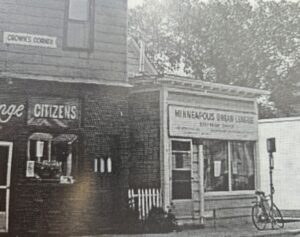
In 1928, there were 42 Urban Leagues in the United States, including Minneapolis and St. Paul chapters. In Minnesota, the Negro community was active and growing in the first two decades of the century. Wendell Jones, a postal clerk on Washington Avenue, was among the first to pay the fee to become a charter member of the Minneapolis-St. Paul affiliate in 1926. “At that time, there was no office, no paid staff — just a meeting in a church,” said Wendell.
1940s
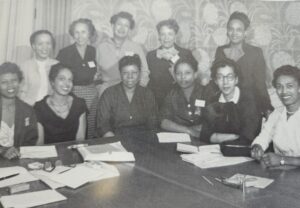
Although there was no segregation by law in Minnesota, it was impossible for a black man to be served in a restaurant in Minneapolis. In the late 1940s, African Americans were the largest minority yet the school system did not have a single black teacher. The Minneapolis Urban League was still a small operation utilizing mostly community volunteers and coalitions among churches and other groups.
1960s
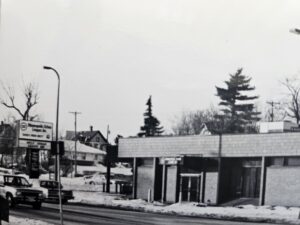
The Minneapolis Urban League was one of the first to move from its location in the downtown business district into the neighborhoods. Affiliates established Street Academies, launched voter education drives and undertook community health and neighborhood improvement programs. They demanded that white institutions respond. Social services alone could not eliminate the problems. Only changing the system would suffice. Yet blacks were more segregated, more concentrated in a physical space than ever before. The difference at the end of the sixties was that the inhabitants were volatile, informed citizens who were not afraid of white political or economic power and they occupied key sections of the nation’s most important cities.
1990s
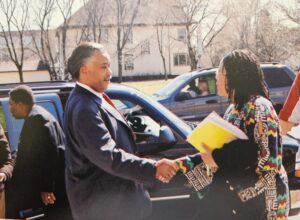
The Minneapolis Urban League grew along with the national organization and by the mid-1990s, the Minneapolis Urban League reached over 25,000 people each year through education, employment, individual client services and public policy advocacy. The staff included over 100 full and part-time employees most of whom lived in the areas they serve.
2010
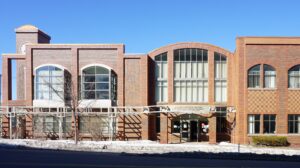
Twenty-first century progress included a new strategic plan and the launch in 2010 of the Minneapolis Urban League’s Gateway to Opportunity framework for program and service delivery. As demographic changes brought an increased population of African descendants to Minnesota, and with it an increased demand on Urban League services, the Minneapolis Urban League responded by redoubling efforts to work collaboratively and strategically to respond to the critical needs of our constituency. In 2015, the Minneapolis Urban League convened an array of community groups and advocacy organizations serving African American and African immigrant people to plan a legislative strategy and set a priority agenda for consideration by our state legislature. The resultant United Black Legislative Agenda was able to push through a historic equity bill that appropriated $35 million to address racial equity around the state.
2015
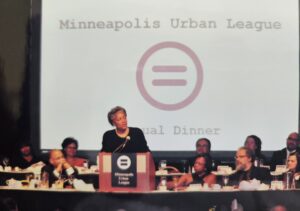
Now, as we confront a new climate of political change and opportunity, our focus on building coalitions and partnerships will continue. With support from the National Urban League as well as from major philanthropic, political and community leadership, the Minneapolis Urban League will begin to explore the feasibility of a metro expansion. This expansion will increase the organization’s footprint into areas of the Twin Cities metropolitan area that have long experienced an increased demand for culturally-specific programming and service delivery.
2017
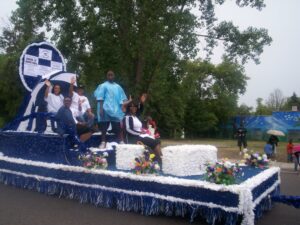
In 2017, The Minneapolis Urban League Board of Directors completed work on a strategic framework document that charted the course for the agency through 2020. In 2021, Urban League Twin Cities (ULTC), as we are currently known, launched a strategic planning process to set its direction for years 2022-2025. The intended outcome of this process was a Strategic Framework for continuing the ULTC’s commitment to being the first place that Twin Cities’ African descendants turn to for programs, services, and hope during difficult times.
2022
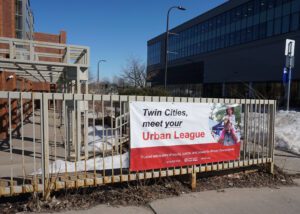
The activities involved in developing the 2022-2025 strategic Framework inspired and energized the ULTC strategic planning committee, board, and staff to continue to produce excellent programs and services for youth, families, and communities of African ancestry and provided a renewed focus and new vision where “we believe an equitable and just society can be realized.” The Framework supports engagement with multiple ULTC stakeholders, including the ULTC donors, program and service participants, communities of African descendants, other influencers, and the Urban League movement. Both the ULTC board and staff are excited about the work ahead and invite all ULTC stakeholders to join in the journey.
Current
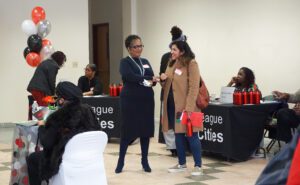
The ULTC continues to work to fulfill our role as a leader, convener and trusted voice that sets the agenda and drives solutions. We believe an equitable society can be realized and envision a future in which African descendants are fully engaged, empowered and invested in the success and well-being of the Twin Cities metropolitan area.
